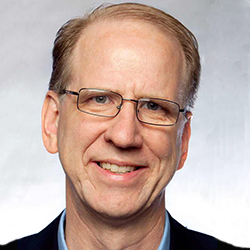Personalizing the News: Does It Work?
Artificial intelligence can personalize many experiences, from online shopping to the videos you watch and the music you hear on your favorite streaming services. Now research is underway to develop an experimental platform for testing news recommender systems. The system will expose people to news stories on topics that interest them and measure outcomes such as clicks, reader retention, and reading diversity.
 Edward C. Malthouse – Northwestern Erastus Otis Haven professor of integrated marketing communications, professor of industrial engineering, researcher at Medill’s Local News Initiative, and research director of the Medill IMC Spiegel Research Center – is part of a multi-university research team that will develop the testing platform, which will be available for other scholars to use. The National Science Foundation is funding the project through its Computer and Information Science and Engineering Community Research Infrastructure program.
Edward C. Malthouse – Northwestern Erastus Otis Haven professor of integrated marketing communications, professor of industrial engineering, researcher at Medill’s Local News Initiative, and research director of the Medill IMC Spiegel Research Center – is part of a multi-university research team that will develop the testing platform, which will be available for other scholars to use. The National Science Foundation is funding the project through its Computer and Information Science and Engineering Community Research Infrastructure program.
The design is still under discussion, but the idea is to build a news recommender system infrastructure that news readers can experiment with so that researchers can learn what works best. Several thousand reader panelists will be recruited to use the system.
“The end goal is to have a system up and running that will enable testing,” Malthouse said. “I’m hoping other scholars come in and create better algorithms to improve the public’s knowledge of what’s happening in the world around them.”
Researchers already have a vision for what they want to create. In 2021, Malthouse co-wrote a research paper entitled, “Toward the Next Generation of News Recommender Systems,” with four other authors, including Jeremy Gilbert, Northwestern Knight professor in digital media strategy, and Himan Abdollahpouri, former Northwestern postdoctoral scholar. The paper proposed a table d'hote (or a host’s table) for news, balancing content from stories people needed to know along with serendipity, or articles that offer surprises.
The challenge will be to engage readers with diverse content. Research shows social media recommender systems exacerbated an environment in which people only encountered information that reflected or reinforced their own beliefs. These algorithms, which are designed to increase engagement, contributed to political polarization and misinformation.
“Different scholars have different ideas on how to break the echo chamber,” Malthouse said. “Our job is to create a testing environment to see whether those theories work best.”
Malthouse said there is currently only one publicly available news dataset that tracks which stories were recommended to people and what they clicked on. The team intends to take this a step further by enabling randomized controlled testing with designed experiments.
To test the system, researchers may send a newsletter and monitor whether people open the email. The system will also track which stories people clicked on and whether they continue to read the newsletter.
Malthouse hopes to eventually work with the local news industry to help them implement machine learning systems, since most local news organizations don’t use recommender systems, which Malthouse attributes to a lack of resources.
“I hope the algorithms that get developed improve people’s reading experience to the point where they pay for news,” Malthouse said. “The way to do it is to have good content and to help people find that content.”
The origin of this project was inspired by the University of Minnesota’s MovieLens research lab. Principal Investigator Joseph Konstan was involved in creating the MovieLens tool, which provides a laboratory for personalized movie recommendations.
The other researchers working on this project are Co-Principal Investigator Daniel Kluver, University of Minnesota lecturer in computer science and engineering; Michael Ekstrand, associate professor of computer science at Boise State University; Bart Knijnenburg, assistant professor in human-centered computing at Clemson University; and Robin Burke, Northwestern graduate and the University of Colorado Boulder information science department chair and professor.
